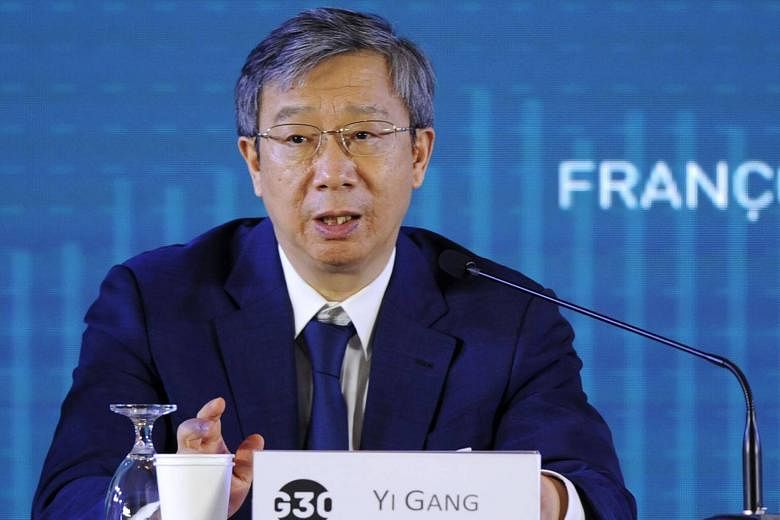Trade tensions will rattle the global economy significantly, and countries must work together towards a constructive solution, said China's central bank governor Yi Gang, who said Beijing is sincerely looking to resolve tensions with the US.
His call came a day after US Treasury Secretary Steven Mnuchin dismissed fears that the US-China trade row would threaten the world economy, insisting that Washington's moves were a bid to push for a "more balanced trading relationship" with Beijing to the benefit of all.
But Mr Yi stressed yesterday that the trade dispute would lead to a lose-lose situation, pointing out that representatives from over a dozen countries he met in Bali over the past week had all reported their economies felt the negative impact.
The International Monetary Fund (IMF) last week slashed global growth forecast to 3.7 per cent, citing rising trade tensions.
Mr Yi agreed with this revision, saying at the Group of 30 International Banking Seminar on the last day of the IMF-World Bank's annual meetings that trade tensions have created negative expectations and uncertainties, unsettling markets.
"(China is) sincere in showing that we are willing to have a constructive solution," he said. "We have to realise the significant negative impact of trade tensions, and the whole world should work together to seek a constructive solution."
Other speakers were also concerned about trade disputes and protectionism, urging cooperation over conflict. Mr Francois Villeroy de Galhau, governor of France's central bank, said the indirect effects of protectionism - such as diminishing business confidence - are often underestimated. The chairman of the G-30 board of trustees, Dr Jacob Frenkel, said the plea to protect the multilateral trade system surfaced time and again at the annual meetings over the past week.
The United States has been vocal about its goods trade deficit with China, but Mr Yi pointed out the US' hefty US$40 billion (S$55 billion) per year services trade surplus with his country, that has grown some 20 per cent a year. China will press on with reforms to open up its economy, as well as strengthen intellectual property rights protection, added Mr Yi.
The session - moderated by Singapore's Deputy Prime Minister Tharman Shanmugaratnam, who is also chairman of the Monetary Authority of Singapore - saw central bankers from around the world discussing issues such as the world economy and inclusive growth.
Mr Tharman is the chairman of G-30, an international panel of top financial experts that seeks to deepen understanding of global economic and financial issues.
The heavy discussions were interspersed with lighter moments, such as Dr Frenkel declaring Christopher Columbus, the Italian explorer who went looking for Asia and found America instead, as an economist who "brought all the problems". "Now the same America has created the tensions, and we hope that we will learn the lessons."
Mr Tharman wrapped up the seminar with advice from yet another influencer - "an economist called Elvis Presley, who's unfortunately deceased now but made a significant impact on economic thought".
"In one of his master treatises he said: 'A little less conversation, a little more action, please. A little less fight and a little more spark'," Mr Tharman said, invoking the lines of the Presley hit A Little Less Conversation to raucous laughter.
SEE TOP OF THE NEWS:
IMF-World Bank meetings billed a success by officials
Jakarta to get $1.4b from World Bank for disaster readiness, relief

